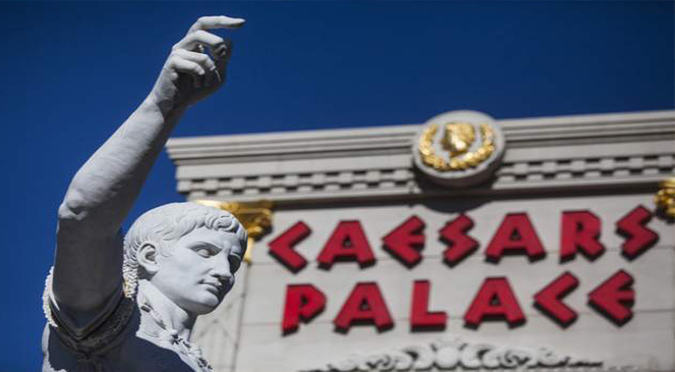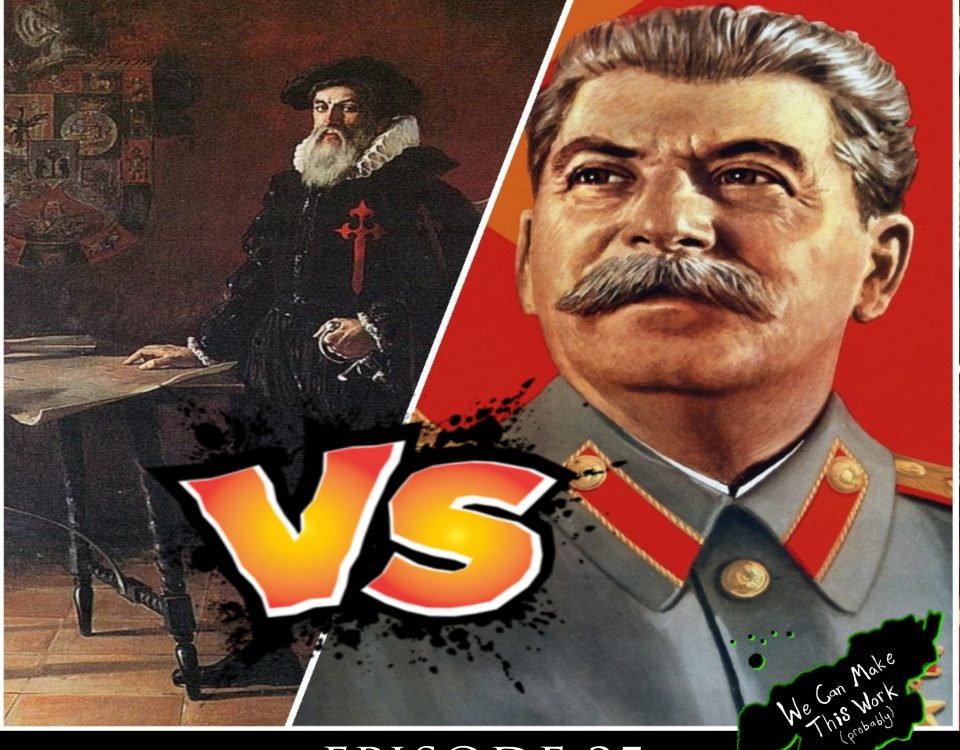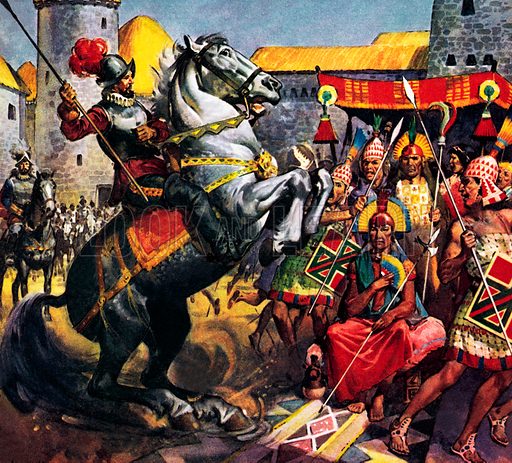
CLEOPATRA – Last Pharaoh of Egypt…
February 14, 2015
15 Most Infamous CYBER HEISTS!
May 20, 2015Gaius Julius Caesar 100-44 BCE
Caesar, Julius Caesar, is one of the most famous figures in history for a reason. And as you probably guessed, that reason was not an endless supply of modesty…
The story of Caesar is the story of Rome – and it’s transition from Republic to Empire at the height of its all consuming power, and the man who wanted it all for himself. Ironically, his exuberant success would lead to his ultimate failure. He forged Rome into an Empire and yet planted the very seed of its destruction. More polarizing than American politics, Caesar was both a hero and villain, egotistical warlord and benevolent statesmen, he truly was an enigma, to both historians and the people that knew him.
And at every turn he could not for the life of him keep it in his toga…
RISE OF THE REPUBLIC

Rome was first founded way way back in 753 BCE. Although not much is known about the early days of the city, it is known that Rome was ruled by an elected monarchy, well that is until 509 BCE when Lucius Tarquinius Superbus, the seventh and last King of Rome, ruined it for everyone by being a total d-bag. In fact Tarquinius was such a tyrannical a-hole that the people of Rome kicked him out of office and completely obliterated the monarchy to make way for their own form of government, creating the very first Republic just to ensure that they’d never again be at the mercy of some egotistical madman ever again.

Unfortunately it didn’t quite work out that way…
Many governments even today have been inspired by the Roman Republic’s hierarchical legal system which was in turn a variation on Athen’s Democratic system. This proto-Republican form of government was ruled by two elected consuls and the Senate which was comprised entirely of rich old, land-owning, white dudes of noble status. It was certainly a step up from your average dictatorship, but in many ways it was far from perfect. Women in Roman society had absolutely no power and plebeians, the common folk, had almost no say in politics. The Republic emphasized two things: military service and politics, which to them were one and the same.
Problem was that high political offices were highly revered, yet Romans were super paranoid and didn’t like it when someone gained too much popularity, which often lead to a constant circle of backhanded compliments, jealousy, and juicy gossip. (Sounds just like high school all over again!)

Pictured: Roman Senators
These self-serving Senators often resorted to military campaigns to resolve their disputes for selfish gain leading to a series of civil wars that threatened to tear the country apart at the seams. So pretty much exactly like 90210 but with more stabbing and slightly less estrogen…
SULLA v MARIUS
“Cry Havoc! – and let slip the dogs of war.” – Mark Antony (Shakespeare’s “Julius Caesar”)

I said ‘Romans’ not ‘Romulans’!
There were two opposing forces at work at Rome when Caesar was born, the Populares – who championed for the power of the people, and the Optimates – who believed the aristocracy should have more control. Caesar grew up during a deadly civil war between the two political factions, headed by Sulla and Marius.
 Lucius Cornelius Sulla, Marius’s rival, was a general / consul, of the Optimates movement, who marched his army into Rome to seize power and slaughtered all who opposed him. Gaius Marius, Caesar’s uncle, was a general / consul, in the Populares party, who was forced into exile in Africa. Marius returned with an army of his own while Sulla was off fighting campaigns in Greece and murdered tons of Sulla’s supporters in retaliation.
Lucius Cornelius Sulla, Marius’s rival, was a general / consul, of the Optimates movement, who marched his army into Rome to seize power and slaughtered all who opposed him. Gaius Marius, Caesar’s uncle, was a general / consul, in the Populares party, who was forced into exile in Africa. Marius returned with an army of his own while Sulla was off fighting campaigns in Greece and murdered tons of Sulla’s supporters in retaliation.
When Marius died, the old regime was overthrown by Sulla, who retook over and declared himself dictator of Rome and (once again) killed all who stood in his way. It’s said that he had hundreds assassinated and exiled.
THE DAWN OF CAESAR
“Friends, Romans, countrymen, lend me your ears…” – Antony (Shakespeare’s “Julius Caesar”)

Caesar crossing the… oh wait, wrong Caesar…
Gaius Julius Caesar claimed to have been descended from the semi-mythical Trojan war hero, Aeneas, from the works of Homer and Virgil (see: The Fall of Troy). The name ‘Caesar’ supposedly comes from one of his ancestors who killed an elephant one time. At the age of 16 (85 BCE), Caesar’s dad died, leaving him in charge of the family – and the entire province of Asia, which is a serious amount of responsibility all at once!

– Uncle Marius
It was during Uncle Marius’s short-lived reign, that he appointed his nephew, Caesar, as the high-priest of Jupiter. He also married his first wife, Cornelia, and together they had a daughter, Julia Caesaris. Young Caesar may have lost his priesthood gig when Sulla came back to town, but at least he narrowly managed to avoid the dictator’s wrath by signing up with the army, just to get the hell out of Rome.
In the military, Julius gained significant experience abroad, serving with distinction and earning the Civic Crown. He also may or may not have crossed paths with Spartacus during The Third Servile War. Upon hearing of Sulla’s death, Caesar returned home and became a prosecuting advocate, championing the commoners and gaining their respect. He soon gained legendary status both home and abroad for his tactical genius and playboy charms.
 This one time, while traveling across the Aegean Sea to Rhodes, Caesar was attacked and captured by Cilician Pirates!
This one time, while traveling across the Aegean Sea to Rhodes, Caesar was attacked and captured by Cilician Pirates!
The pirates held him ransom for forty days. When Caesar discovered he was being ransomed for 20 silver talents, he was appalled and told them he was worth at least 50. Even though he was their prisoner, J.C. won them over with his frat boy demeanor. One night when they were all drinking around a campfire, their captive / bro made an off-handed comment about brutally crucifying them all to which they all laughed uncontrollably, presumably while Caesar slowly drank his whine in silence. Turns out he wasn’t joking. Sure enough, the high ransom was paid and Caesar immediately set about raising a navy and began to hunt down the pirates one by one.
A man of his word, Caesar captured and executed every last one of them.
You just don’t mess with Julius Caesar and live to tell the tale…

THE LEGEND GROWS
“I’ll either return a victor, or not at all.” – Caesar

“Hmmm. I think I’ll have the salad.”
In 74 BCE, Caesar lead a private army to take on Mithradates VI Eupator, the king of Pontus, just for the Hell of it. He was then elected to Tribune of the military, his first step towards political dominance and eventually rose to Quaestor, the head of Rome’s financial institutions.
 Perhaps the most impressive thing about Caesar’s career, was his ability to turn every disadvantage to his advantage. He was practically a nobody, yet made his name known through his quick wit, charm, and clever speeches. For instance, he was practically broke when he was put in charge of the gladiatorial games and yet through numerous favors and loans, he managed to turn these events into lavish performances worthy of Cirque Du Soleil (with a bit more blood and less acrobatics).
Perhaps the most impressive thing about Caesar’s career, was his ability to turn every disadvantage to his advantage. He was practically a nobody, yet made his name known through his quick wit, charm, and clever speeches. For instance, he was practically broke when he was put in charge of the gladiatorial games and yet through numerous favors and loans, he managed to turn these events into lavish performances worthy of Cirque Du Soleil (with a bit more blood and less acrobatics).
Caesar used the gladiator games to gain even more support from the citizens of Rome, which began to worry his enemies in the Senate. He went into a lot of debt to accomplish his goals, with a single-minded ferocity that it would all work out, like a high-stakes gambler going all in against a casino run by the mob.

In 63 BCE, Caesar used his newly gained political clout during his campaign for the esteemed position of Pontifex Maximus, (Head Priest) essentially the Pope of Roman paganism. He was elected through the purchase of votes, intent solely on using the position for further political gain. He could care less about traditions and honors, for Caesar it was all a means to an end…
THE TRIUMVIRATE
“The higher we are placed, the more humbly we should walk.” – Cicero

In 67 BCE two powerful adversaries were elected consul: Marcus Licinius Crassus and Gnaeus Pompeius Magnus aka Pompey the Great. Pompey and Crassus were two of the richest and most ambitious men in the world, their egos only out-shined by each other. They had joined forces previously against the might of Spartacus and his rebellion. This time though they faced opposition in the Senate.
 The Senate refused to give Pompey’s soldiers the land he’d promised them and Crassus craved military glory. Caesar approached them with a offer they couldn’t refuse. Together they combined their resources – the immense wealth Crassus had obtained through nefarious means, the military might Pompey had gathered by force, and the various connections that Caesar had collected along the way. Caesar once had Cato the Younger forcibly removed from the Senate to stop a filibuster. (Can you imagine someone pulling this in Congress?!)
The Senate refused to give Pompey’s soldiers the land he’d promised them and Crassus craved military glory. Caesar approached them with a offer they couldn’t refuse. Together they combined their resources – the immense wealth Crassus had obtained through nefarious means, the military might Pompey had gathered by force, and the various connections that Caesar had collected along the way. Caesar once had Cato the Younger forcibly removed from the Senate to stop a filibuster. (Can you imagine someone pulling this in Congress?!)
Like a union of super villains, this trio of tyrannical tycoons took the Republic hostage with their manipulative back door deals. In 59 BCE, Caesar used Crassus and Pompey to secure his own position as Consul. In return, Caesar granted legislation in their favor, getting land for Pompey’s veterans in Spain and securing Crassus’s command of the army in the East. Meanwhile, Caesar married wife #2, Pompeia.
Then in 53 BCE, their plans fell apart when Crassus foolishly got himself killed attempting to capture Parthia. Not only did he fail to defeat an enemy he outnumbered, he then retreated, leaving 4,000 Roman soldiers behind, and then got shanked under a false flag of truce (FAIL).
Soon after, Caesar and Pompey would become bitter enemies.
THE CONQUEST OF GAUL
“I came, I saw, I conquered.” – Caesar

One day Caesar up and decided he was going to conquer the world (take that Alexander the Great!). He looked over the map and noticed some spots that hadn’t quite become a part of Rome yet. He decided they could use some more Republicanism in that big chunk of blank space to the north-west of modern day Italy: the Celtic controlled region of modern day France known as Gaul.
 For the next EIGHT YEARS, (58-50 BCE) Caesar’s legionnaires marched on Gaul, killing over a million people and enslaved a million more. It technically wasn’t a genocide, only because he only killed civilians who resisted his ruthless plundering. At one point during the Gallic Wars, Caesar turned his attention towards a British invasion, but failed to conquer the Native Britons on two separate occasions before giving up and heading home.
For the next EIGHT YEARS, (58-50 BCE) Caesar’s legionnaires marched on Gaul, killing over a million people and enslaved a million more. It technically wasn’t a genocide, only because he only killed civilians who resisted his ruthless plundering. At one point during the Gallic Wars, Caesar turned his attention towards a British invasion, but failed to conquer the Native Britons on two separate occasions before giving up and heading home.
It was in Gaul where Caesar would patent the ‘divide and conquer’ tactic and even went on to write a bestseller in the third person just because. Julius didn’t sweat the fact that he was hopelessly outnumbered by axe-swinging hairy barbarians in unknown terrain. He once disguised himself as a beggar to risk crossing enemy lines in order to touch base with his comrades, which earned him mad respect. He had a way of pumping up his troops like no other Roman before him.

In 52 BCE, Vercingetorix, one of the Gallic chieftains united the tribes for one final (crazy) offensive against the Roman legions at Alesia. After defeating the initial wave of cavalry, Caesar ordered a massive siege wall and trench built around the town, isolating it from reinforcements and supplies, eventually forcing Veringetorix to surrender. Veringetorix physically threw down his arms at Caesar’s feet in a show of submission.
Typically Caesar was merciful to his vanquished foes, but for some reason Veringetorix had really pissed him off, so had him imprisoned, paraded around Rome and then executed. I’m guessing it was because he was sick of trying to pronounce his name.
DICTATOR FOR LIFE
“The die is cast.” – Caesar

YOLO
In 50 BCE, Pompey got all jelly and ordered Caesar to disband his army and return to Rome. Caesar had another idea: he returned home with his army. Caesar’s legion crossed the Rubicon river in defiance of the Roman Senate and ignited a civil war against Pompey. There could be only one.
The two legendary conquerors battled it out across Europe, before Pompey hightailed it to Egypt where he was somewhat anticlimactically beheaded. While Julius was in Egypt he took a vacation with his baby mama, Cleopatra, before heading home to his (third) wife, Calpurnia, back in Rome. Which I’m sure was in all the headlines of the tabloids back then.
 In 48 BCE, Caesar was appointed dictator for a year, which was then extended into a ten year term. During his time as supreme ruler, he actually enacted quite a few surprisingly positive changes, including tax reform, the extension of voting rights, reduced congestion in the city, a police force, and a revised calendar which the current Gregorian calendar was based off of! By 44 BCE, the masses were practically worshiping him. In fact some actually *were* worshiping him. They renamed the month of July after him and Mark Antony even attempted to crown him a King before his groupies, but he refused, instead Gaius Julius Caesar declared himself Dictator for Life.
In 48 BCE, Caesar was appointed dictator for a year, which was then extended into a ten year term. During his time as supreme ruler, he actually enacted quite a few surprisingly positive changes, including tax reform, the extension of voting rights, reduced congestion in the city, a police force, and a revised calendar which the current Gregorian calendar was based off of! By 44 BCE, the masses were practically worshiping him. In fact some actually *were* worshiping him. They renamed the month of July after him and Mark Antony even attempted to crown him a King before his groupies, but he refused, instead Gaius Julius Caesar declared himself Dictator for Life.
Caesar had defeated many other of his fellow countrymen in battle, but instead of killing them, he would often pardon them and make them his allies, which was very unusual for a Roman leader. As a result, many of his former adversaries served alongside him in the Senate and as it turns out, a lot of them still had a grudge. It also didn’t help that he flaunted his fame and fortune, erecting statues in his honor, and even sat on a golden throne!

He did what???
Caesar becoming dictator was the last straw. With his new position of power he actually made A TON of reforms for the lower class, which rubbed the wealthy aristocrats the wrong way. They saw Caesar as a threat to their own power. All the while, he was macking on half the senate’s wives, so maybe that also played a part in what happened next…?
THE ASSASSINATION
“Beware the Ides of March.” – Soothsayer (William Shakespeare’s “Julius Caesar”)

You see, Caesar was warned of a plot against him, but shrugged it off. He refused to be accompanied by his bodyguards as he was led into the Senate on the 15th of March. His loyal friend, Mark Antony, was momentarily distracted by the conspirators long enough for Brutus and 60 other knife-wielding Senators to assassinate him in the public forum!

Julius Caesar was taken by surprise and stabbed *23* times! In the disorienting chaos, many of the assailants accidentally cut each other. Caesar’s body lay dying in a pool of blood at the foot of Pompey’s statue. According to Shakespeare’s famous play, Caesar’s last words were “E tu, Brute’?” in response to Brutus’s surprising betrayal, BUT he may have actually said something along the lines of, “And you my son?” – in reality though he probably didn’t get a chance to say anything, because he was too busy dying of 23 stab wounds.

“It wasn’t me.” – Brutus
Why did Brutus do it? Well for one, Caesar was having an affair with his mom (and probably bragging about it), so I imagine that may have been a factor.
The assassins believed they were doing the right thing by freeing the people from the grip of a tyrant, but as it turns out they couldn’t be more wrong. Rome as a whole saw Caesar as their champion. They were appalled at his brutal murder and revolted in the streets. Little did the conspirators realize, they’d actually paved the way for someone much much worse…
AUGUSTUS – SON OF CAESAR
“I found Rome a city of bricks and left it a city of marble.” – Augustus

“I Can’t help that I’m popular.” – Augustus
Yet another civil war immediately broke out in response to Caesar’s death.
Gaius Octavius, also known as Octavian, Caesar’s grand-nephew and adopted son, was chosen as the heir to Caesar’s throne. Octavian joined forces with Mark Antony to hunt down Brutus and the rest of the conspirators. Many former Senators who championed the Old Republic, like Cicero, were also executed as enemies of the state. Octavian then turned the tables against Antony who fled with Cleopatra to Egypt where they took their own lives.
Octavian then ordered the death of Caesar’s only son (with Cleopatra) Caesarion, just to ensure there would be no one to challenge his title as ‘First Citizen of Rome’. (Seriously?!) Octavian then changed his name to Augustus, becoming the first Roman Emperor. As Emperor, Augustus initiated Pax Romana – which was basically peace by force. Augustus was followed by a long line of psychopathic megalomaniacs like Caligula and Nero, eventually causing the decline of Rome, plummeting all of Europe into the Dark Ages.
The death of Caesar was the fall of the Republic and the rise of the Roman Empire.

ERIK SLADER
Hope you enjoyed this edition of “Epik Fails of History!”, if you have any questions, concerns, or suggestions let me know in the comments below! Also, be sure to ’Like’ EPiK FAILs on Facebook, or Follow on Twitter, and SHARE IT with your friends!
 —– More articles on Historic Failure:
—– More articles on Historic Failure:
—Sources:
“CAESAR: Life of a Colossus” by Adrian Keith Goldsworthy
“The Assassination of Julius Caesar” by Michael Parenti
“Twelve Greeks and Romans Who Changed the World” by Carl J. Richard

“Outnumbered” by Cormac O’ Brien
“Lives of the Caesars” – Suetonius
“When Rome Ruled: Killing Caesar” (2010 – History documentary)
http://www.biography.com/people/julius-caesar-9192504
http://www.history.com/topics/ancient-history/julius-caesar
http://www.pbs.org/empires/romans/empire/republic.html
http://www.roman-empire.net/republic/caesar-index.html
http://en.wikiquote.org/wiki/Julius_Caesar






1 Comment
[…] in Rome (48 BCE), some dude called Julius Caesar and this other Roman guy named Pompey (the Great?) were at each other’s throats. Something […]